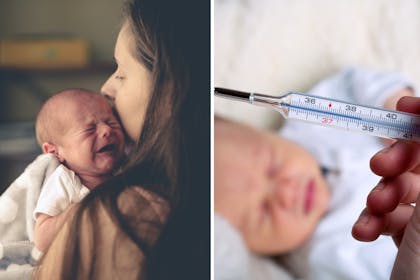'Stop kissing babies and tots' – mum's warning over common childhood illness

RSV can cause coughs and colds which develops to bronchiolitis in some babies – this can be severe in some cases
As we enter the colder months of the year, parents of babies and toddlers should be aware of the effects of Respiratory syncytial virus (RSV.)
RSV is a viral infection which for most children will manifest as a case of the sniffles, but it can be more harmful for babies, particularly little ones who were born prematurely.
1 mum's post warning post on Instagram has this week gone viral as she makes it clear how easily it can spread.
FREE NEWBORN NAPPIES
- Girl, 12, hospitalised from vaping
- This app could tell if your toddler has autism
- What is the Warm Home Discount and how do I apply?
- Kids could be forced to brush their teeth at school under new plans
'Your friendly reminder'
The post which has almost 6,000 likes, reads: 'It's RSV season and this is your friendly reminder to NOT KISS babies & toddlers on the hands or faces if they aren't your child.
'Even if you are immediate family. This is not about you. This is about protecting children from becoming seriously sick.'
Abby who goes by @themotherhoodhome on Instagram captioned the post: 'In fact, just don’t kiss babies full stop. This is just a reminder that RSV season is here.'
'So sad and scary'
Parents were quick to respond to Abby's post.
One said: 'Sending this to my parents. They love kissing my son (first grand baby) and with his asthma he’s super vulnerable to RSV!'
Another said: 'My husband and I had RSV, it was brutal, I can’t imagine a baby having that 😢 so sad and scary!'
And a third said: 'When I was a 6 month old baby I developed RSV and had to be hospitalized for it.
'It’s ridiculous to me how some people especially family can feel so entitled to kiss vulnerable babies when it’s not even their kid.'
What is RSV?
Respiratory syncytial virus (RSV) is a common respiratory virus that usually causes mild, cold-like symptoms.
However, it can be dangerous for babies, toddlers, and older adults.
According to the NHS, almost all children will be infected with by the time they are 2.
In older children and adults RSV can just cause a cold or cough but in young children, it can cause bronchiolitis which can lead to problems with feeding and even breathing.
Symptoms of RSV include:
- A runny or blocked nose
- A cough
- Sometimes a fever (a temperature of 38c or more)
Children can also sometimes get ear infections with RSV.
How do children catch RSV?
RSV is highly contagious. It can spread to children if an infected person coughs or sneezes and droplets enter the child's nose, eyes or mouth.
It can also be spread when a child has direct contact with the virus, including if someone who has RSV kisses the face of a child.
A child could also catch RSV if they touch a surface which has the virus on it – like a doorknob – and then touch their face or puts their hands in their mouth.
When should parents be worried?
Most cases of RSV can be treated at home but if you are worried about your child's cough or cold, you can ring the non-emergency NHS service on 111 or give your GP a call.
RSV is most severe in the elderly and babies under 1 as it can cause bronchiolitis and pneumonia, and hospitalisation.
Make sure you ring 999 if any of the following apply:
- Your child is having difficulty breathing – you may notice grunting noises or their tummy sucking under their ribs
- There are pauses when they breathe
- Their skin, tongue or lips are blue
- Your child is floppy and will not wake up or stay awake
Leading cause of bronchiolitis
RSV is the leading cause of bronchiolitis in babies and young children.
Bronchiolitis is an infection that is mild for most babies, but in 2 to 3% of cases, symptoms are more severe and can lead to hospitalisation over breathing difficulties.
Early symptoms of bronchiolitis in babies, like RSV, are generally just a runny nose and a cough but can also include:
- A slightly raised temperature
- A rasping, persistent dry cough
- Difficulty feeding
- Fewer wet nappies
- Rapid or noisy breathing or wheezing
- Brief pauses in breathing
- Vomiting after feeding
Premature babies, those with heart or lung conditions and babies with weakened immune systems are most at risk of the more severe symptoms.
Preventing bronchiolitis
The NHS recommends the following to lower the chance of your child getting or spreading bronchiolitis:
- Wash your and your child's hands often
- Wash or wipe down toys and clean surfaces regularly
- Use disposable tissues and throw them away as soon as you're done
- Keep newborn babies away from anyone with a cold or the flu
- Don't smoke around your child as this can increase the likelihood of them getting bronchiolitis
RSV season
RSV reason usually starts in October and lasts for 4 to 5 months with a peak in December.
Last season figures were higher than usual which was said to be down to the Covid lockdowns of previous years as children weren't at school preventing RSV from spreading as usual.
Need advice?
Our health visitors and nursery nurses are online Monday to Friday evenings to answer your queries on feeding, sleep and child health.
Related stories
Urgent warning over baby formula preparation machines
CHAT: All things babies in our friendly forums
Warning over fear babies could choke if fed with colostrum collection kits






